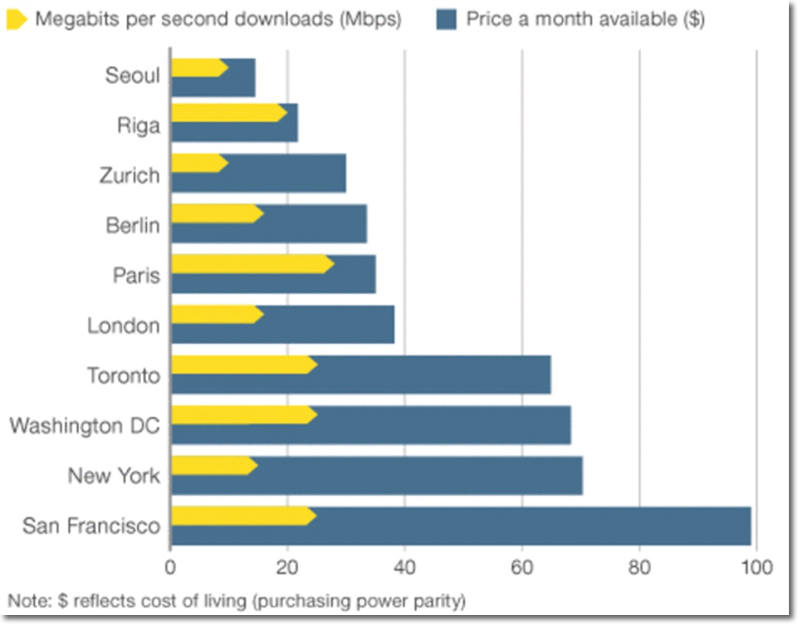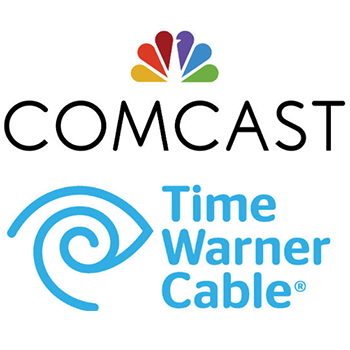Comcast Folds - But No Dancing In the Streets Yet

We may have dodged the Comcast/Time Warner bullet but we’re still far from getting rid of the antiquated set-top boxes and cable modems that only exist to protect juicy old business models.
We can breathe a sigh of relief: The proposed $45B merger between Comcast and Time Warner Cable (TWC) is dead.
When the merger was announced with size-appropriate fanfare just before Valentine’s Day, 2014, normal humans saw the deal as clearly dangerous.
How could “Concast”, a company that’s unanimously despised and indisputably abusive, be allowed to bear down with even greater weight on our collective neck?
In a salvo of Orwellian doublespeak, Comcast assured us that less competition and a more dominant provider would translate into a dream come true for consumers and competitors:
“Transaction Creates Multiple Pro-Consumer and Pro-Competitive Benefits, Including for Small and Medium-Sized Businesses…This transaction will be accretive and will yield many synergies and benefits in the years ahead.”
This Freedom Is Slavery agitprop is evidence of Comcast’s belief in our passive idiocy - but it’s more than that. It’s a testament to the company’s faith in its political chicanery. Combined, Comcast and Time Warner Cable spent an outlandish $25M trying to persuade lawmakers to endorse the deal, and showered campaign donations on both parties – a little bit more on Democrats. (And let’s not forget that Comcast CEO Brian Roberts is President Obama’s golf buddy).
The political machinations don’t stop there. As uncovered by The Verge, Comcast ghostwrote pro-merger letters that were delivered to the FCC:
“…Mayor Jere Wood of Roswell, Georgia, sent a letter to the Federal Communications Commission expressing emphatic support for Comcast’s controversial effort to merge with Time Warner Cable… Yet Wood’s letter made one key omission: Neither Wood nor anyone representing Roswell’s residents wrote his letter to the FCC. Instead, a vice president of external affairs at Comcast authored the missive word for word in Mayor Wood’s voice.”
Dipping into this bag of tricks has worked before. After all, Comcast got away with an anti-competitive deal when it acquired NBC in spite of the obvious anti-competitive distribution advantage stemming from its huge Cable TV footprint.
Yet, Comcast insists that the sentiments are genuine, an “outpouring of thoughtful and positive comments“. The company pronounced itself “especially gratified for the support of mayors and other local officials, […] underscoring the powerful benefits of this transaction for their cities, constituents, and customers.”
As Consumerist reminds us, this is the company that resorts to tortuous customer rentention tricks and foments a culture of customer disrespect. We’ve all experienced the poor customer service and bad attitudes, the last minute appointment cancellations, the phone reps who know nothing about our accounts. During a visit to Comcast Palo Alto, one rep tells me I can self-install while another rudely insists that I ignore what I’ve just been told.
I can’t blame the customer service employees. Deprived by management of any ability to access data or to exercise judgment, they’re just following the script and emulating the examples set by their bosses. I blame the execs who don tuxedos and put on airs of benevolent prosperity at charity balls in Washington and Philadelphia. They’re the ones who created the culture and then feign bewilderment and concern when they discover that customers don’t like Comcast. About a month ago, when the merger hung in the balance, the @ComcastCares Twitter account suddenly displayed increased activity, after repeated apologies and the appointment of a Senior VP of Customer Experience last September.
But arrogance, mendacity, and poor customer service weren’t enough to stop the merger. ‘Twas Net Neutrality killed the Beast.
The Comcast/TWC deal was initially seen as a Cable TV merger, with a combined market share that approached 30% of Pay TV. But Pay TV is sliding into the past. Internet connectivity, broadband speed, and reliability are what matter now, and an expanded Comcast would have garnered more than 40% market share. That’s a portion that can’t be squared with the concept of a free (as in freedom, not free beer) and open Internet. After the FCC issued Net Neutrality rules - which were immediately challenged by our freedom loving carrier friends - the notion that 40% of public access and about 50% of “triple play” services would be handed to a single company became intolerable.
So, we dodged that bullet. But entrenched players and their convoluted business models still keep us far from where today’s technology wants to take us.
First, an old issue: Extortionate channel bundling. Why must we buy a bunch of channels we’ll never watch just to get the few we actually want? A la carte distribution should be the norm.
Second, everything ought to be on-demand from the Cloud. It’s not that much of a fantasy: today, I can set up a recording from my Xfinity set-top box and then watch it from my laptop or tablet anywhere in the world - especially in places where Internet access is better and less expensive than in the US. See the following graph and sigh:
Cost of Broadband/TV/Phone Packages Around The World

Source: New America Foundation
As Joe Palmer, a former colleague and current friend likes to say: It costs more, but it does less.
Lastly, our regulators should force carriers to let users connect a Brand X, Y, or Z box to the Cable network. Why must we put up with the clutter of a Comcast Internet modem and Wi-Fi access point, an Xfinity set-top box and DVR, and a Microsoft Xbox? Satya Nadella would love to sell us a single, universal Xbox. I have no doubt Tim Cook would look kindly on an all-in-one Apple “iBox” that replaces the two Comcast boxes and combines it with an Apple TV and a Time Capsule.
There will be dancing in the streets when we throw away today’s cable modems and set-top boxes. It will happen…but I won’t hold my breath. It will take time and repeated attempts to tear down the blockades erected by Comcast, AT&T, and the other carriers.
About the Author

Jean-Louis Gassée is currently general partner at the venture capital firm Allegis Capital since 2003. In late 1990, he founded Be, Inc., a multi-media system software company, took it to the Nasdaq in 1999 and sold it to Palm in 2001. Jean-Louis started Apple France in 1981, moved to Cupertino, California in 1985 and became president of the Apple Products Division, covering worldwide product development, manufacturing and product marketing. He has served as a director of publicly traded companies such as Cray Computer Corporation, 3Com and Logitech. He currently sits on the Board of Directors’ of Electronics for Imaging and was until late 2005 Chairman of PalmSource. He is a Mathematics and Physics graduate of Paris (Orsay). He lives in Palo Alto, California.
More SC24/7 on “Net Neutrality”

Article Topics
CTIA News & Resources
U.S. Court Backs Landmark Obama Internet Equal-Access Rules - Net Neutrality Upheld Microsoft and Facebook to Build Massive Internet Cable across the Atlantic Comcast Folds - But No Dancing In the Streets Yet Why America’s Internet Is So Slow and Broken Net Neutrality and Technical Challenges of Mobile Broadband Networks Net Neutrality: The Difference Between Wired & Wireless Explained FCC Chairman’s Net Neutrality Plan Turns Broadband into a Public Utility More CTIALatest in Technology
Spotlight Startup: Cart.com Walmart and Swisslog Expand Partnership with New Texas Facility Taking Stock of Today’s Robotics Market and What the Future Holds Biden Gives Samsung $6.4 Billion For Texas Semiconductor Plants Apple Overtaken as World’s Largest Phone Seller Walmart Unleashes Autonomous Lift Trucks at Four High-Tech DCs Talking Supply Chain: Procurement and the AI revolution More Technology












